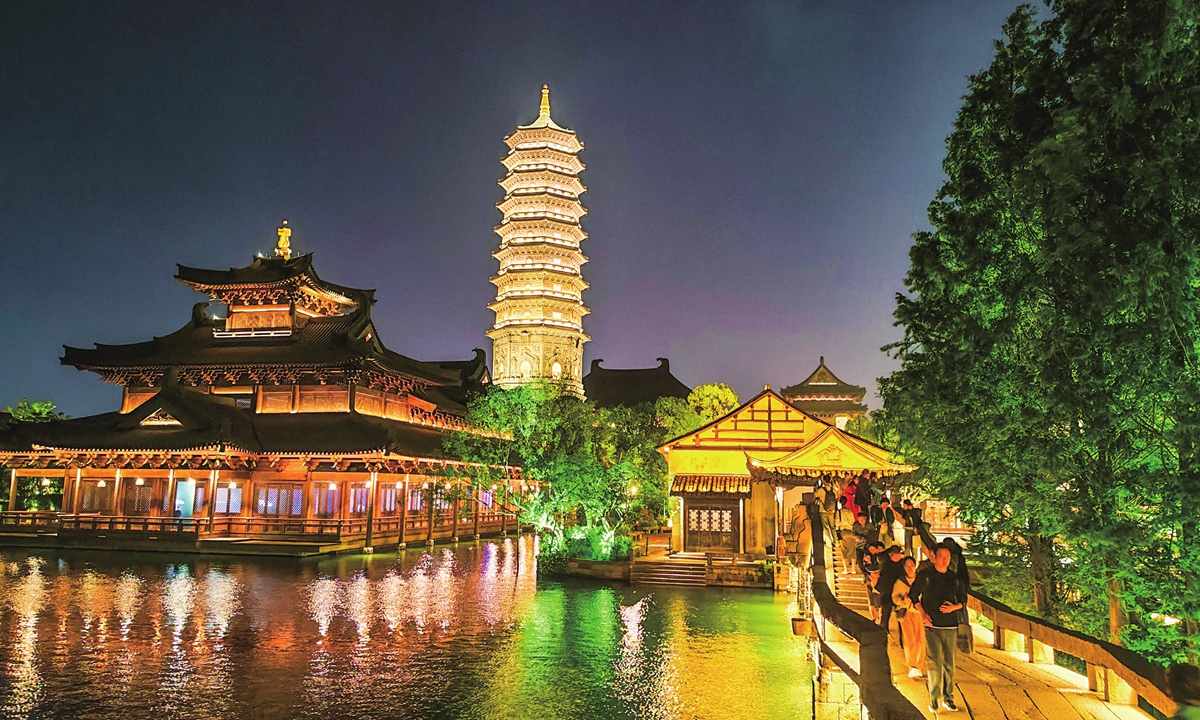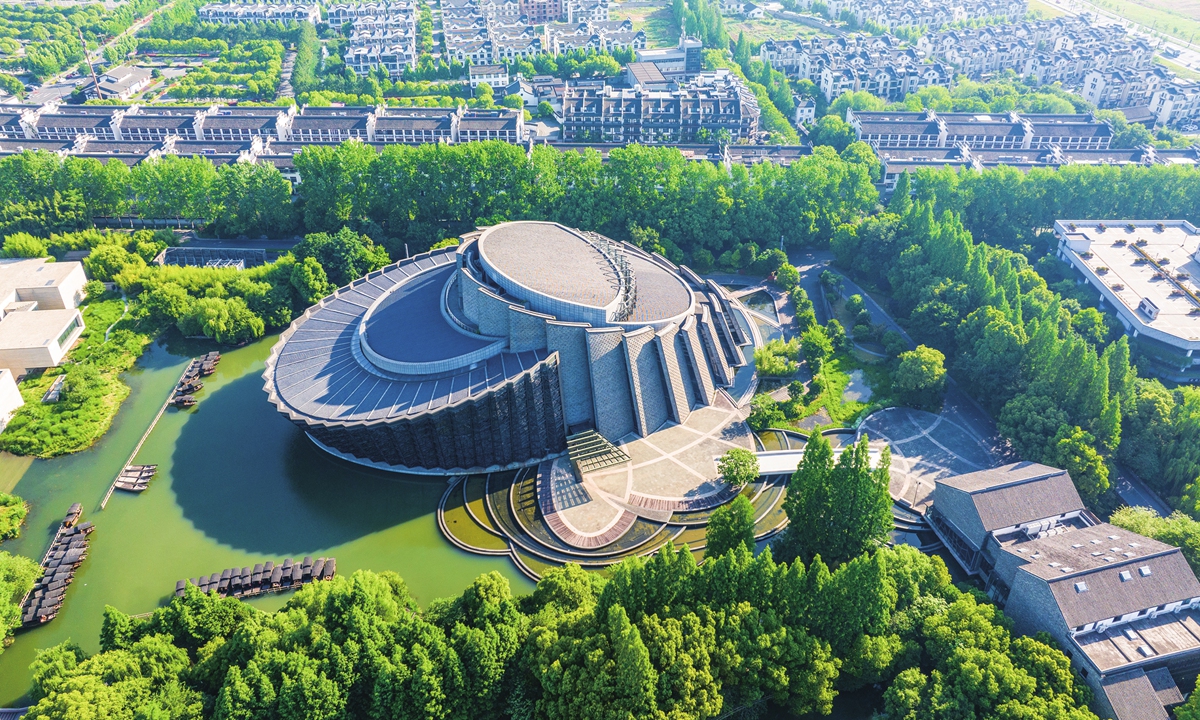
A night view of Puyuan township on April 26, 2024 Photos: VCG
Boasting elements like stone bridges, winding rivers and elegant above-water architecture, ancient towns are highlights to the landscape of China's Jiangnan. Jiangnan is a geographic area that is commonly known as the south of the mighty Yangtze River.
Built with a touch of garden aesthetics, these towns are popular touristic destinations. Comparing to renowned sites like the Zhouzhuang Town in Jiangsu Province, the Puyuan Fashion Resort, opened to public in 2023, is an emerging spot that shows how an old rural town can sustain people's modern and fashionable lifestyles.
Old yet fashionable Puyuan is located in Tongxiang, East China's Zhejiang Province. Its history dates back to the Southern Song Dynasty (1127-1279), and the town is one of the stops where the Beijing-Hangzhou Canal flows through.
To promote the protection of the ancient canal culture heritage, in 2016, a renovation project was carried out in Puyuan, covering an area of approximately 858,000 square meters.
In order to preserve the traditional look of the town's above-water architectures, the renovation project followed the concept of "repairing old buildings by keeping their old aesthetics while also integrating new cultural and commercial elements into the town," Yao Jie, a manager of the resort, told the Global Times.
Nine well-preserved ancient bridges, including the Zong'an Bridge and the Dayou Bridge are distributed along the "H"-shaped river system of the Puyuan Fashion Resort. Many of those bridges date back to the Qing Dynasty (1644-1911).
Some of those bridges connect to inns. For instance, an owner of the Xianzi Beach Inn told the Global Times that the inn is not the biggest one in the resort, but it can offer an "authentic taste of Puyuan" as guests can see the green and clear river flowing beneath their feet just by opening their bedroom's window.
Wooden boats and shuttle buses are always available in the resort. Boats take visitors underneath the bridges' arches to arrive at notable scenic spots in the ancient town. Two popular local destinations are the Meijing Theater, founded in 1947 and offering performances of the traditional
Yue Opera, and the Xiangyun Taoist Temple, a symbol of the Taoist philosophy's development in the region, built in the Yuan Dynasty (1279-1368).
The ancient town's time-honored locations are mixed with new buildings including modern hotels, performance plazas, and a visitor center that boasts a T-stage venue for fashion shows.
Puyuan, where the resort is located, is one of China's most dynamic centers for fashion production, especially in the cashmere and knitwear sectors. Around 700 million sweaters made in Puyuan are sold worldwide every year.
Relying on the Town's solid foundation in the clothing industry, the resort has found its niche character of promoting shows and exhibitions that connect to the international market.
One of its strategies is to collaborate with the entertainment industry. It has invited highly popular reality shows such as
Funny Team 2024 to film at the resort. In the show, Chinese stars such as Na Ying and Huang Zitao run around the resort, taking audiences on a visual journey around Puyuan's beautiful scenic spots.
In 2023, the resort organized a successful campaign in collaboration with the Chinese version of the fashion magazine Gentlemen's Quarterly, also known as GQ. By having superstars such as Fei Xiang (also known as Kris Phillips, is a Chinese-American pop icon and musical singer) posting photos of the resort, the fashion title of the ancient town was accentuated.
"There are many ancient towns in China, and we need to give them unique themes to make them stand out. This is the creative strategy we need to promote Chinese ancient towns," Xiao Junfu, a marketer of the touristic industry, told the Global Times.

The Wuzhen Grand Theater in Jiaxing, East China's Zhejiang Province, on May 17, 2024
Niche interests
Other than Puyuan, the Wuzhen Town and Xitang Town, two ancient water towns nestled in Jiaxing, East China's Zhejiang Province, have also embarked on a journey of remarkable transformation.
Wuzhen Town, whose roots trace back over 1,000 years, found a way to bridge the gap between past and future. Its once quiet canals, lined with Ming Dynasty (1368-1644) and Qing Dynasty (1368-1644) buildings, became the stage for a new kind of digital dialogue: the town's transformation began with its establishment as the permanent home of the World Internet Conference, cementing its role as a digital pioneer.
But it was the birth of the Wuzhen Theatre Festival in 2013 that truly brought Wuzhen's spirit into full bloom. The event integrated Wuzhen's historical landscape with cutting-edge theater, making the town a beacon of artistic and cultural exchange.
A few kilometers away, Xitang Town embarked on its own revival journey. Originally created back in the Spring and Autumn Period (770BC-476BC), the town still thrives nowadays thanks to its own unique cultural initiatives. For example, the Xitang Hanfu Culture Week showcases not only the town's past but also its deep connection to Chinese tradition. During the week, people dress in elegant Hanfu attire strolling through the streets, bringing the past vividly to life as workshops and parades make the town a living museum of ancient fashion.
The Xitang Ancient Town Protection Regulations of Jiaxing City released in 2023, further promote the construction of an ecological cultural tourism zone and the integration of ancient town culture and tourism, while continuing to protect the cultural heritage and traditional architecture of the ancient town.
Together, the Wuzhen and Xitang water towns breathe a new life, exemplary for the cultivation of a new cultural ecology in historical towns, one that honors the past while embracing the future.





